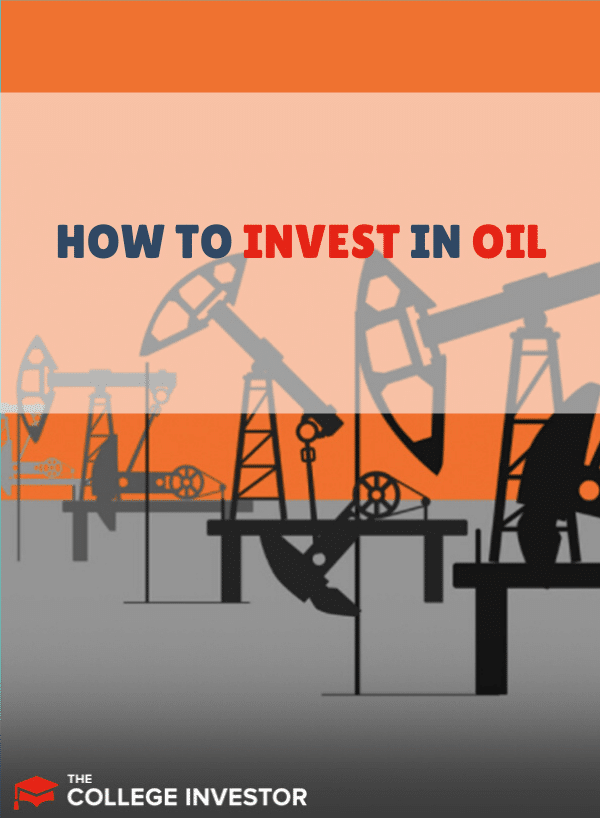
If you're wanting to learn how to invest in oil, it's important to point out right off the bat that oil investing isn't for everyone. To give you an example of how wild of a ride oil can be, consider the fact that West Texas Intermediate was trading in the mid-50s in February. Then it fell to negative $37.63 on April 20.
The plunge was due to the reduced travel caused by the Covid lockdowns. As demand for oil dried up, storage swelled. Negative prices reflected the fact that futures traders were willing to pay someone to take delivery of their oil.
Oil has been a source of speculation and investment for several years, with the bulk being done by traders. But, as a beginner, how do you invest in such a volatile commodity? There are a few ways to invest in oil - some more volatile and risky than others.
Before rushing to buy a futures contract or calling your broker about spot prices, first consult the following beginner’s guide to investing in oil. You'll learn everything you need to know about how to invest in oil including how much of your portfolio oil should comprise and your best oil investment options.
Beginners Beware
Before we discuss how to invest in oil, it must be stated that investing in oil may not be the best place for a total beginner to start. For one thing, as we've already mentioned, oil (like all commodities) is often subject to rapid, day-to-day price fluctuations.
An investor who has never been through the ups and downs of a market might be shell-shocked to log into their brokerage account and see that their oil holdings have fallen 50% overnight.
Oil is also what might be called a “hands-on” investment strategy. Unlike an index fund, where your money is passively invested across a large cross section of the stock market, oil typically requires deciding when to buy and sell. This is fine for full-time investors who have the time to monitor their investments all day.
But for those just starting out, it will be difficult to keep the watchful eye oil investing calls for. Frankly, research suggests few individuals can pull it off at all. The exception to this rule is oil ETFs, a more passive strategy discussed later in this article.
Oil Should Represent A Small Portion of Your Portfolio
Even for experienced investors, oil should typically consume only a small percentage of your overall investment portfolio. The reason, again, is diversification and modern portfolio theory. It’s never wise to stake your entire portfolio on a single volatile commodity that can either double or halve overnight (as commodities frequently do).
Having 20% or 30% of your portfolio in oil would be terrific if oil prices skyrocketed. That much is obvious — but what happens when we suddenly overthrow the Iranian government and cheap oil floods the market, causing oil prices to fall? Answer: the plunge takes 20 or 30 percent of your portfolio down with it. Not smart.
On the other hand, by keeping a small slice of your portfolio (say, 2% or 5%) in oil positions, you can prosper from upside without being devastated by downside. It’s all about finding the right balance between risk and reward. Again, the more of a beginner you are, the more conservative you should probably be.
Choose A Low-Cost Brokerage
To start investing in oil, you’ll want to open an online brokerage account if you haven’t already. Many brokerages now allow you to buy stocks and ETFs commission-free.
Once Charles Schwab announced back in October of 2019 that they were moving to commission-free trades, nearly every other brokerage had no choice but to follow.
Other commission-free brokerages include Etrade, Ally Invest, and Fidelity. There are factional-share brokerages as well, such as Robinhood (also commission-free).
How To Invest In Oil: Five Investing Options
There’s no “one right way” to invest in oil. Feel free to pick one or more of the following strategies based on your unique resources, strengths, and weaknesses as an investor:
ETFs (Exchange-Traded Funds)
ETFs are a very common way of both investing and trading oil and are more suited to traders since they can be traded intraday. One popular oil ETF is USO, The United States Oil Fund®.
USO tracks the daily price movements of West Texas Intermediate ("WTI") light, sweet crude oil. It's one of the closest ways to invest in oil without trading futures or options. You can invest or trade USO with nearly any brokerage. USO has an expense ratio of 0.76%.
Mutual Funds
For longer-term investing, you may want to consider an oil mutual fund. These mutual funds don’t invest directly in oil but give you indirect exposure by investing in various oil-related energy companies.
Just keep in mind that, like all mutual funds, you won't be able to buy or sell oil mutual shares until after the market closes each day. This makes oil mutual funds a poor choice if you plan to make frequent trades.
The Vanguard Energy Fund Investor Shares (VGENX) is a strong oil mutual fund option. It has an expense ratio of only 0.37%. You can invest in VGENX directly through Vanguard. There is no transaction cost or commissions. All costs are rolled into the expense ratio. VGENX can also be purchased and sold at other brokerages.
Watch cost on other mutual funds, as their expense ratios can be high. The Fidelity® Select Energy Portfolio has a 0.87% expense ratio for example. And the Natural Resources Trust fund from BlackRock has an expense ratio of 1.19%.
Oil Stocks
Rather than investing in a mutual fund that contains several energy-related companies, you can pick specific companies to invest in.
Know that stock picking takes more research and time. You'll want to make sure the company you invest in is sound. However, a good starting point is to choose the same companies that energy mutual funds are investing in.
Oil-related stocks include those in the oil industry, such as drillers, producers, and rigs. These include Chevron, ExxonMobile, Royal Dutch Shell, and Phillips 66.
MLPs
Master Limited Partnerships (MLPs) are energy stocks that pay high dividends (called distributions in the MLP world). Distributions from MLPs are often paid quarterly.
Each MLP is a publicly-traded partnership. Buying shares of an MLP stock means you are a partner rather than an investor. This type of structure also means that you’ll pay taxes only on the distributions.
MLPs may not appreciate as much as oil/energy stocks. However, that doesn’t mean they are completely immune to volatility. In March 2020, many MLPs suffered huge losses as oil prices plunged.
Related: Investing in MLPs: Yields are High, but Complications Are Many
Futures And Options
Futures and options aren’t really long-term investments. They are closer to trading. Buying an options contract gives you the right, but not the obligation, to buy or sell an oil investment (such as a stock or ETF) at a pre-negotiated price by a specified expiration date.
Buying an oil futures contract gives you the obligation to buy or sell an oil investment at a specific price. With both types of investments, the goal is to profit on the future transaction based on your predictions of where the market is going.
Futures contracts are often difficult to understand if you're not extremely well-versed in their contractual language, and therefore, are not advisable for beginners. Minimum buys (say, $10,000 or more) also tend to prohibit college-aged investors from getting involved.
When commission-free stock trading was introduced, base rates for options went away. Now traders only have to pay a commission on each option contract, usually around $0.65. Futures also have a per contract fee of around $1.00-$1.50 per contract.
Trading futures and options are the riskiest ways to gain exposure to oil. It takes experience and skill to successfully trade futures and options. You should only dabble in trading these assets if you're willing to put in the time and research it will require of you to achieve success.
Final Thoughts
Properly done, oil investing can become a viable part (emphasis on the word “part”) of your long-term investing strategy.
As a single commodity, it should not make up a large portion of your portfolio by itself. But if you invest in oil in a way that reflects your investing profile, it can add solid contributions to your annual returns for years to come.
For more ideas on how to invest in commodities, check out our complete guide. Or if you're just looking to build the foundation of your investing portfolio, start here. Finally, don't forget to check out the best stock brokers as chosen by our readers.

Robert Farrington is America’s Millennial Money Expert® and America’s Student Loan Debt Expert™, and the founder of The College Investor, a personal finance site dedicated to helping millennials escape student loan debt to start investing and building wealth for the future. You can learn more about him on the About Page or on his personal site RobertFarrington.com.
He regularly writes about investing, student loan debt, and general personal finance topics geared toward anyone wanting to earn more, get out of debt, and start building wealth for the future.
He has been quoted in major publications, including the New York Times, Wall Street Journal, Washington Post, ABC, NBC, Today, and more. He is also a regular contributor to Forbes.
Editor: Clint Proctor Reviewed by: Chris Muller
